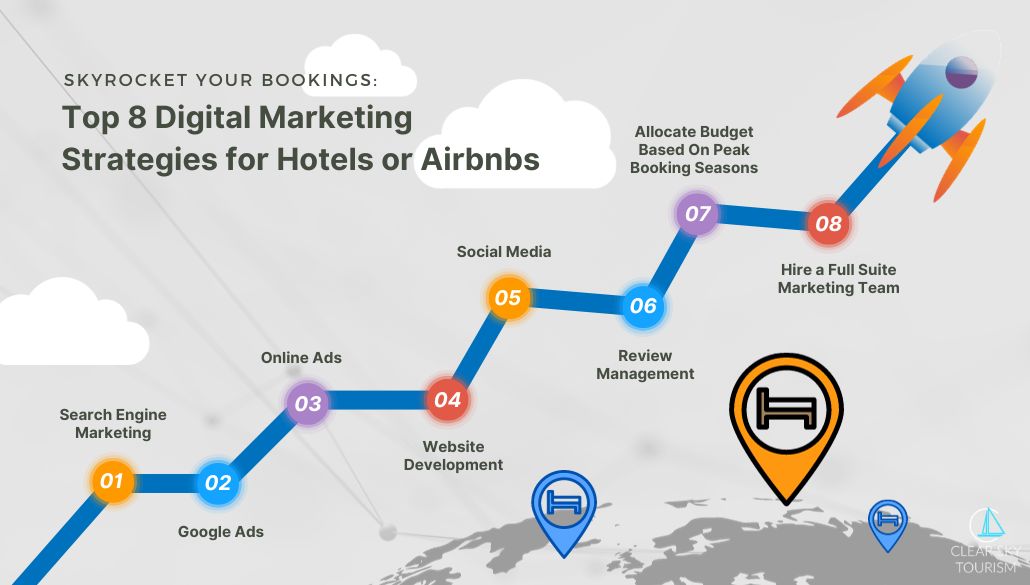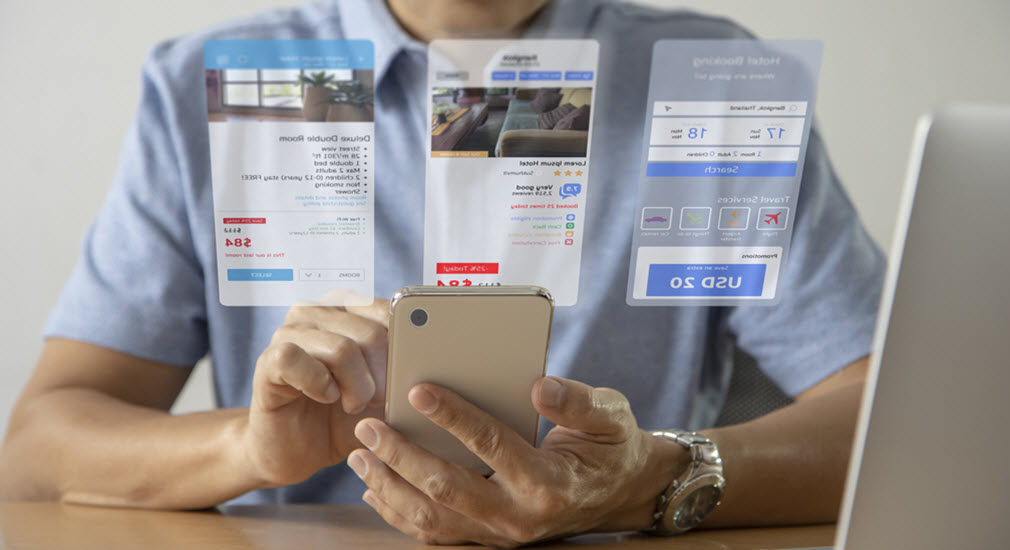If you operate a hotel or Airbnb, you are constantly seeking new ways to help increase bookings. Although the digital age makes it easier for travelers to find you, it also presents its own issues. Whether it’s poor online reviews from fickle guests, competing with other websites for rankings, offering competitive pricing, or new competition such as eco-hotels and glamping yurts, if you don’t have an effective digital marketing strategy, you make it impossible for guests to find you.
Here we share the top eight digital marketing strategies proven to help skyrocket bookings for small business hotels and Airbnbs.

1. Search Engine Marketing
If someone’s searching for a place to stay, they need to find you. Search engine optimization is the best way to become visible on Google, but competition for those high-ranking spots is stiff in the hospitality industry. Think of search engines as the new travel agent, not asking for commission yet sending tons of customers your way. However, this relationship only works when your website is optimized with typical keywords travelers use when searching for accommodation.
You need to make it easy for guests so they can decide whether you meet their needs and quickly book their stay. Since most travelers start their vacations with online searches, you need optimized stand-out images that entice travelers to visit your location while also attracting search engines. This is because SEO isn’t just about using logical hotel keywords in your content. It requires three different elements to make you visible on Google:
- Technical: Behind-the-scenes pieces of your site
- On-page: Including keywords in your content
- Off-page: Getting other sites to link to yours for more credibility
As a result, you need an expert that understands how to incorporate these three elements to outrank the competition and boost your bookings.
2. Google Ads
You can’t rely on organic optimization to help you rise in the rankings. Instead, you need to invest in Google ads to augment your SEO efforts. The SERP (search engine results page) for hotel-related searches is driven by paid ads that appear above organic results. If you want to remain competitive and be recognized by search engines, achieving those high-ranking spots takes an investment.
However, Google ads use a competitive bidding process that determines when and where your ads appear. Therefore, for effective advertising, you need an experienced tourism marketing team who a) understand the industry and b) understand the bidding process. They’ll consider your goals and budget to determine what keywords you should target to ensure you aren’t constantly outbid.
3. Online Ads
Online ad campaigns provide an instant and direct connection with travelers seeking accommodation. Why wait for customers to come to you when you can go to them? You can drive bookings through compelling digital advertising designed for tour and activity providers struggling with empty rooms and canceled activities due to a lack of interest. Online ads help drive bookings to appear right when customers need you the most.
For example, remarketing allows you to follow visitors to your site around the internet, reminding them you’re the best choice for their accommodation needs. You can also run highly targeted ad campaigns to reach a specific audience using enticing display ads directing them to your site. Your hotel or Airbnb is front and center throughout guest research as a constant reminder that the most beautiful accommodations await.
Ad campaigns also allow you to ramp things up during your peak seasons or present special pricing and offers when things slow down. Constructing new hospitality campaigns, including groups of target audiences, ads with varying visuals, headlines, text, and calls to action, can also be tested so you continue to see better and better engagement and increased conversions. As a result, you begin to see greater and greater ROI.

4. Website Development
Your website must be designed to turn visitors into guests. Tourism websites have one goal: Increasing bookings. That calls for outstanding website design focused on aspirational imagery that entices visitors to book now. Alluring views from your rooms, tours of your property and amenities, and a focus on your tourist area and location all contribute to the types of first impressions that lead to bookings.
Since online bookings are the norm, your website is like your concierge, greeting guests and setting the tone for what type of travel experience they can expect. It also tells visitors the type of service you offer, so you need to create an easy process to complete a reservation.
Hiring a website development company specializing in tourism ensures they reinvent your website to appeal to your ideal audience. High-end photography, simple navigation, informative yet concise descriptions that answer questions, and straightforward pricing and package options all help trigger a response that leads to bookings. Adding special touches like virtual tours, 360-degree room tools, and balcony views avoids mid-booking abandonment because everything guests need is at their fingertips.
5. Social Media
You know your guests spend significant time on social media, so using those platforms to engage with customers and encourage bookings is a must. What could be more perfect for an industry specializing in experiences than to share those experiences with ongoing posts? Social media shows guests immersed in exceptional travel experiences. This is your chance to shine and show potential visitors why they can’t live another day without booking a stay. Your posts allow people to discover the wonders of your accommodation and location and the people who will make their experiences extraordinary.
However, you need to choose the right platform to appeal to your ideal guest. Do you attract seniors or young people? Couples or singles? Families or couples? Affluent or budget-minded guests? All these considerations help you find the right platform and create the types of posts that will resonate with your audience. This isn’t easy without the assistance of an experienced social media team who can create a strategy that creates the exact image you need to attract more bookings.
6. Review Management
Reviews in the hospitality industry are the lifeblood of your business. Since you provide experiences, reviews can completely destroy your image or compel travelers to book with you because you specialize in extraordinary experiences. You can kiss bookings goodbye without reviews because reviews build trust, so visitors feel confident they can book a reservation and won’t be disappointed.

However, this form of social proof can backfire if you don’t take the time to track your reviews and encourage happy guests to contribute comments while their memories are still fresh. The more positive reviews you have, the higher you rank in SERPs. You need a strategy that manages reviews and ensures you continue seeing new, positive reviews daily. You also need review management to address bad reviews and take a proactive approach by helping to resolve issues.
Getting more online reviews takes work but can be made easier with automated thank-you texts and emails asking customers for reviews. Providing a quick link or the chance to simply click the number of stars to rate you right in the message is the best way to get people to rank you while their pleasant visit is still on their minds. Daily email notifications telling you when new reviews are posted also allow you to keep track of your ratings and glean meaningful insights that help you improve customer experiences.
7. Allocate Budget Based On Peak Booking Seasons
As mentioned in strategy #3, you can make the most of your digital marketing budget by focusing on peak booking seasons. For example, ski resorts will be busy at different times than beach rentals. Although it makes sense to allocate more money to your busy season, year-round accommodations might want to track bookings and look for opportunities to increase ads during downtimes. This helps create a steadier stream of bookings.
It helps to have someone specializing in digital marketing and understanding the tourism industry trends to help create a smart advertising budget. Although you want to adjust your budget based on busy, slow, and steady booking seasons, your ads have to make sense and appear when people tend to book instead of when they actually plan to travel. As a result, you need to plan based on dates people are actively making their bookings. Seasonally driven budget allocation ensures you aren’t wasting money when your typical guest isn’t remotely interested in travel.
8. Hire a Full Suite Marketing Team
The best strategy is to hire a full suite marketing team to tackle your digital marketing strategy. It’s less expensive than dealing with each strategy separately and focuses expertise on the bigger picture for better results. You optimize your budget and your bookings with a higher level of knowledge that considers the right tactics for you. They also back up their tactics with ongoing reports to help you understand how your strategy works and what tactics and channels provide the best ROI.
Boost occupancy rates and attract more guests through effective digital marketing techniques provided by Clear Sky Tourism.

